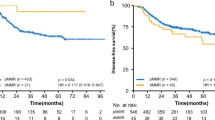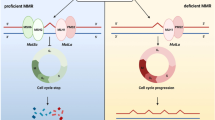Abstract
Recently, individualized approaches for the treatment of locally advanced rectal cancers (RC) have been introduced to determine the most beneficial one for boosting the tumor response and assessing the response more accurately. However, despite each patient and tumor have different molecular features, the studies at the molecular level are very limited. In this study, examining the clinical factors which are predictive of pathologic complete response (pCR), helping to determine a treatment program for the management of patients with locally advanced RC, and evaluating the relation between regression grade and MMR-MSI were aimed. 341 RC cases who had undergone surgery were included and divided into three groups according to their response to neoadjuvant treatment. The following parameters were analyzed for all patients: age at diagnosis, sex, tumor location, tumor differentiation, TNM stage, histological subtype, CEA (mean: < 5 ng/ml) level, lymphovascular-neural invasion, presence of mucinous subtype, grade, MMR, and MSI statuses. 147 patients (43.2%) had no response (group 1), 141 patients (41.3%) had an intermediate response (group 2), and 53 patients (15.5%) had a complete response (group 3). Neoadjuvant chemoradiotherapy was used in all of the patients with the same protocol. Multivariate analysis revealed that clinical T stage (p: 0.099) and MMR (p: 0.048) were the parameters which were significantly associated with pCR. Since MMR and MSI statuses were found to affect pCR, more careful patient selection for “watch and wait” protocol and further studies on molecular structures of the tumors for individualized therapies are required.



Similar content being viewed by others
References
American Cancer Society (2016) Cancer facts and figures 2016. American Cancer Society, Atlanta
van de Velde CJ, Boelens PG, Borras JM, Coebergh JW, Cervantes A, Blomqvist L, Beets-Tan RG, van den Broek CB, Brown G, Van Cutsem E, Espin E, Haustermans K, Glimelius B, Iversen LH, van Krieken JH, Marijnen CA, Henning G, Gore-Booth J, Meldolesi E, Mroczkowski P, Nagtegaal I, Naredi P, Ortiz H, Påhlman L, Quirke P, Rödel C, Roth A, Rutten H, Schmoll HJ, Smith JJ, Tanis PJ, Taylor C, Wibe A, Wiggers T, Gambacorta MA, Aristei C, Valentini V (2014) EURECCA colorectal: multidisciplinary management: european consensus conference colon& rectum. Eur J Cancer 50:1.e1–1.e34. https://doi.org/10.1016/j.ejca.2013.06.048
Sauer R, Liersch T, Merkel S, Fietkau R, Hohenberger W, Hess C, Becker H, Raab HR, Villanueva MT, Witzigmann H, Wittekind C, Beissbarth T, Rödel C (2012) Preoperative versus postoperative chemoradiotherapy for locally advanced rectal cancer: results of the German CAO/ARO/AIO-94 randomized phase III trial after a median follow-up of A 11 years. J Clin Oncol 30:1926–1933. https://doi.org/10.1200/jco.2011.40.1836
Deng Y, Chi P, Lan P, Wang L, Chen W, Cui L, Chen D, Cao J, Wei H, Peng X, Huang Z, Cai G, Zhao R, Huang Z, Xu L, Zhou H, Wei Y, Zhang H, Zheng J, Huang Y, Zhou Z, Cai Y, Kang L, Huang M, Peng J, Ren D, Wang J (2016) Modified FOLFOX6 with or without radiation versus fluorouracil and leucovorin with radiation in neoadjuvant treatment of locally advanced rectal cancer: initial results of the Chinese FOWARC multicenter, open label, randomized three-arm phase III trial. J Clin Oncol 34:3300–3307. https://doi.org/10.1200/JCO.2016.66.6198
Chawla S, Katz AW, Rauh SM, Monson JR (2015) Can surgery be avoided after preoperative chemoradiation for rectal cancer in the era of organ preservation? Current review of literature. Am J Clin Oncol 38:534–540. https://doi.org/10.1097/COC.0000000000000122
Bozkaya Y, Ozdemir NY, Erdem GU, Güner EK, Ürün Y, Demirci NS, Yazıcı O, Köstek O, Zengin N (2018) Clinical predictive factors associated with pathologic complete response in locally advanced rectal cancer. Journal of Oncological Sciences 4:5–10. https://doi.org/10.1016/j.jons.2017.12.004
de la Chapelle A, Hampel H (2010) Clinical relevance of microsatellite instability in colorectal cancer. J Clin Oncol 28:3380–3387. https://doi.org/10.1200/JCO.2009.27.0652
Kim HR, Kim HC, Yun HR, Kim SH, Park CK, Cho YB, Yun SH, Lee WY, Chun HK (2013) An alternative pathway in colorectal carcinogenesis based on the mismatch repair system and p53 expression in Korean patients with sporadic colorectal cancer. Ann Surg Oncol 20:4031–4040. https://doi.org/10.1245/s10434-012-2455-7
Samowitz WS, Curtin K, Wolff RK, Tripp SR, Caan BJ, Slattery ML (2009) Microsatellite instability and survival in rectal cancer. Cancer Causes Control 20:1763–1768. https://doi.org/10.1007/s10552-009-9410-3
Mace AG, Pai RK, Stocchi L, Kalady MF (2015) American Joint Committee on Cancer and College of American Pathologists regression grade: a new prognostic factor in rectal cancer. Dis Colon Rectum 58:32–44. https://doi.org/10.1097/DCR.0000000000000266
Figueiredo N, Panteleimonitis S, Popeskou S, Cunha JF, Qureshi T, Beets GL, Heald RJ, Parvaiz A (2018) Delaying surgery after neoadjuvant chemoradiotherapy in rectal cancer has no influence in surgical approach or short-term clinical outcomes. Eur J SurgOncol 44:484–489. https://doi.org/10.1016/j.ejso.2018.01.088
Sada YH, Tran Cao HS, Chang GJ, Artinyan A, Musher BL, Smaglo BG, Massarweh NN (2018) Prognostic value of neoadjuvant treatment response in locally advanced rectal cancer. J Surg Res 226:15–23. https://doi.org/10.1016/j.jss.2018.01.025
Mullaney TG, Lightner AL, Johnston M, Keck J, Wattchow D (2018) ‘Watch and wait’ after chemoradiotherapy for rectal cancer. ANZ J Surg 88:836–841. https://doi.org/10.1111/ans
Rodel C, Martus P, Papadoupolos T, Füzesi L, Klimpfinger M, Fietkau R, Liersch T, Hohenberger W, Raab R, Sauer R, Wittekind C (2005) Prognostic significance of tumor regression after preoperative chemoradiotherapy for rectal cancer. J Clin Oncol 23:8688–8696. https://doi.org/10.1200/JCO.2005.02.1329
Bohlok A, Hendlisz A, Bouazza F, Galdon MG, Van de Stadt J, Moretti L, El Nakadi I, Liberale G (2018) The potential benefit of adjuvant chemotherapy in locally advanced rectal cancer treated with neoadjuvant chemoradiotherapy is not predicted by tumor regression grade. Int J Colorectal Dis 33:1383–1391. https://doi.org/10.1007/s00384-018-3115-6
Gash KJ, Baser O, Kiran RP (2017) Factors associated with degree of tumour response to neo-adjuvant radiotherapy in rectal cancer and subsequent corresponding outcomes. Eur J Surg Oncol 43:2052–2059. https://doi.org/10.1016/j.ejso.2017.07.024
Choi CH, Kim WD, Lee SJ, Park WY (2012) Clinical predictive factors of pathologic tumor response after preoperative chemoradiotherapy in rectal cancer. Radiat Oncol J 30:99–107. https://doi.org/10.3857/roj.2012.30.3.99
Patel UB, Taylor F, Blomqvist L, George C, Evans H, Tekkis P, Quirke P, Sebag-Montefiore D, Moran B, Heald R, Guthrie A, Bees N, Swift I, Pennert K, Brown G (2011) Magnetic resonance imaging-detected tumor response for locally advanced rectal cancer predicts survival outcomes: MERCURY experience. J ClinOncol 29:3753–3760. https://doi.org/10.1200/JCO.2011.34.9068
Durante AP, Bromberg SH, Barreto E, Cappellano G, de Godoy AC (2004) Prognostic value of lymphatic vessel and neural invasion in colorectal carcinoma. Rev Assoc Med Bras 50:21–26
Vallam KC, Desouza A, Bal M, Patil P, Engineer R, Saklani A (2016) Adenocarcinoma of the rectum composite of three different subtypes with varying outcomes? Clin Colorectal Cancer 15:47–52. https://doi.org/10.1016/j.clcc.2015.12.004
Oh CR, Kim JE, Kang J, Kim SY, Kim KP, Hong YS, Lim SB, Yu CS, Kim JC, Kim J, Jang SJ, Kim TW (2018) Prognostic value of the microsatellite instability status in patients with stage II/III rectal cancer following upfront surgery. Clin Colorectal Cancer 1533–0028(18):30228-7. https://doi.org/10.1016/j.clcc.2018.07.003
Shin JS, Tut TG, Yang T, Lee CS (2013) Radiotherapy response in microsatellite instability related rectal cancer. Korean J Pathol 47:1–8. https://doi.org/10.4132/KoreanJPathol.2013
Lim SH, Chua W, Henderson C, Ng W, Shin JS, Chantrill L, Asghari R, Lee CS, Spring KJ, de Souza P (2015) Predictive and prognostic biomarkers for neoadjuvant chemoradiotherapy in locally advanced rectal cancer. Crit Rev Oncol Hematol 96:67–80. https://doi.org/10.1016/j.critrevonc.2015.05.003
Sargent DJ, Marsoni S, Monges G, Thibodeau SN, Labianca R, Hamilton SR, French AJ, Kabat B, Foster NR, Torri V, Ribic C, Grothey A, Moore M, Zaniboni A, Seitz JF, Sinicrope F, Gallinger S (2010) Defective mismatch repair as a predictive marker for lack of efficacy of fluorouracil-based adjuvant therapy in colon cancer. J Clin Oncol 28:3219–3226. https://doi.org/10.1200/JCO.2009.27
Hasan S, Renz P, Wegner RE, Finley G, Raj M, Monga D, McCormick J, Kirichenko A (2018) Microsatellite Instability (MSI) as an Independent Predictor of Pathologic Complete Response (PCR) in Locally Advanced Rectal Cancer: a National Cancer Database (NCDB) Analysis. Ann Surg. https://doi.org/10.1097/SLA.0000000000003051
Klarskov L, Holck S, Bernstein I, Okkels H, Rambech E, Baldetorp B, Nilbert M (2011) Challenges in the identification of MSH6-associated colorectal cancer: rectal location, less typical histology, and a subset with retained mismatch repair function. Am J Surg Pathol 35:1391–1399. https://doi.org/10.1097/PAS.0b013e318225c3f0
Nazemalhosseini Mojarad E, Kashfi SM, Mirtalebi H, Taleghani MY, Azimzadeh P, Savabkar S, Pourhoseingholi MA, Jalaeikhoo H, Asadzadeh Aghdaei H, Kuppen PJ, Zali MR (2016) L ow level of microsatellite instability correlates with poor clinical prognosis in stage ii colorectal cancer patients. J Oncol 2016:2196703. https://doi.org/10.1155/2016/2196703
Lamberti C, Lundin S, Bogdanow M, Pagenstecher C, Friedrichs N, Büttner R, Sauerbruch T (2007) Microsatellite instability did not predict individual survival of unselected patients with colorectal cancer. Int J Colorectal Dis 22:145–152. https://doi.org/10.1007/s00384-006-0131-8
Hong SP, Min BS, Kim TI, Cheon JH, Kim NK, Kim H, Kim WH (2012) The differential impact of microsatellite instability as a marker of prognosis and tumour response between colon cancer and rectal cancer. Eur J Cancer 48:1235–1243. https://doi.org/10.1016/j.ejca.2011
Sinukumar S, Patil P, Engineer R, Desouza A, Saklani A (2014) Clinical Outcome of patients with complete pathological response to neoadjuvantchemoradiotherapy for locally advanced rectal cancers: the Indian scenario. Gastroenterol Res Pract 2014:1–6. https://doi.org/10.1155/2014/867841
Park IJ, You YN, Agarwal A, Skibber JM, Rodriguez-Bigas MA, Eng C, Feig BW, Das P, Krishnan S, Crane CH, Hu CY, Chang GJ (2012) Neoadjuvant treatment response as an early response indicator for patients with rectal cancer. J ClinOncol 30:1770–1776. https://doi.org/10.1200/JCO.2011.39.7901
Das P, Skibber JM, Rodriguez-Bigas MA, Feig BW, Chang GJ, Wolff RA, Eng C, Krishnan S, Janjan NA, Crane CH (2007) Predictors of tumor response and downstaging in patients who receive preoperative chemoradiation for rectal cancer. Cancer 109:1750–1755. https://doi.org/10.1002/cncr.22625
Hasan S, Renz P, Wegner RE, Finley G, Raj M, Monga D, McCormick J, Kirichenko A (2018) Microsatellite Instability (MSI) as an Independent Predictor of Pathologic Complete Response (PCR) in Locally Advanced Rectal Cancer: a National Cancer Database (NCDB) Analysis. Ann Surg. https://doi.org/10.1097/SLA.0000000000003051
Acknowledgments
The authors thank all the general surgery staff for their cooperation. All the authors read and approved the paper.
Author information
Authors and Affiliations
Corresponding author
Ethics declarations
Conflict of interest
The authors declare no conflict of interest and no financial issues to disclose.
Research involving human participants and/or animals
This study, involving only human participants, has been conducted in accordance with the ethical standards of the Declaration of Helsinki.
Informed consent
Although our paper did not contain any of the stated (by the journal editorial board) individual data, written informed consent which is a legal obligation in our country were obtained from all the patients.
Additional information
Publisher's Note
Springer Nature remains neutral with regard to jurisdictional claims in published maps and institutional affiliations.
Rights and permissions
About this article
Cite this article
Acar, T., Acar, N., Kamer, E. et al. Do microsatellite instability (MSI) and deficient mismatch repair (dMMR) affect the pathologic complete response (pCR) in patients with rectal cancer who received neoadjuvant treatment?. Updates Surg 72, 73–82 (2020). https://doi.org/10.1007/s13304-019-00697-2
Received:
Accepted:
Published:
Issue Date:
DOI: https://doi.org/10.1007/s13304-019-00697-2




